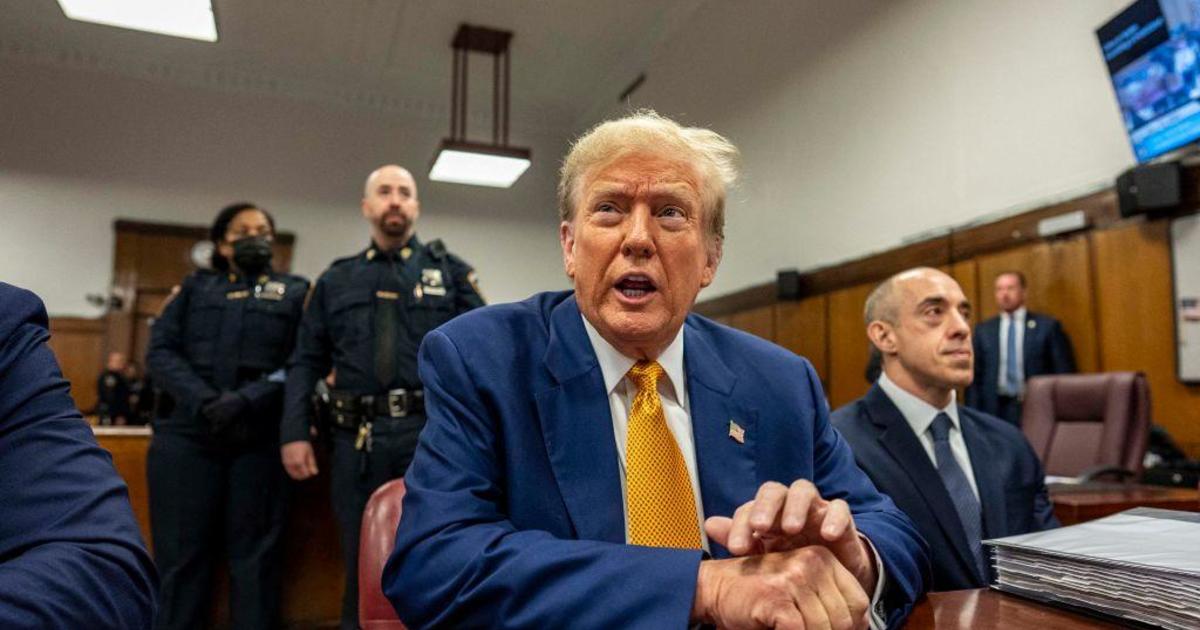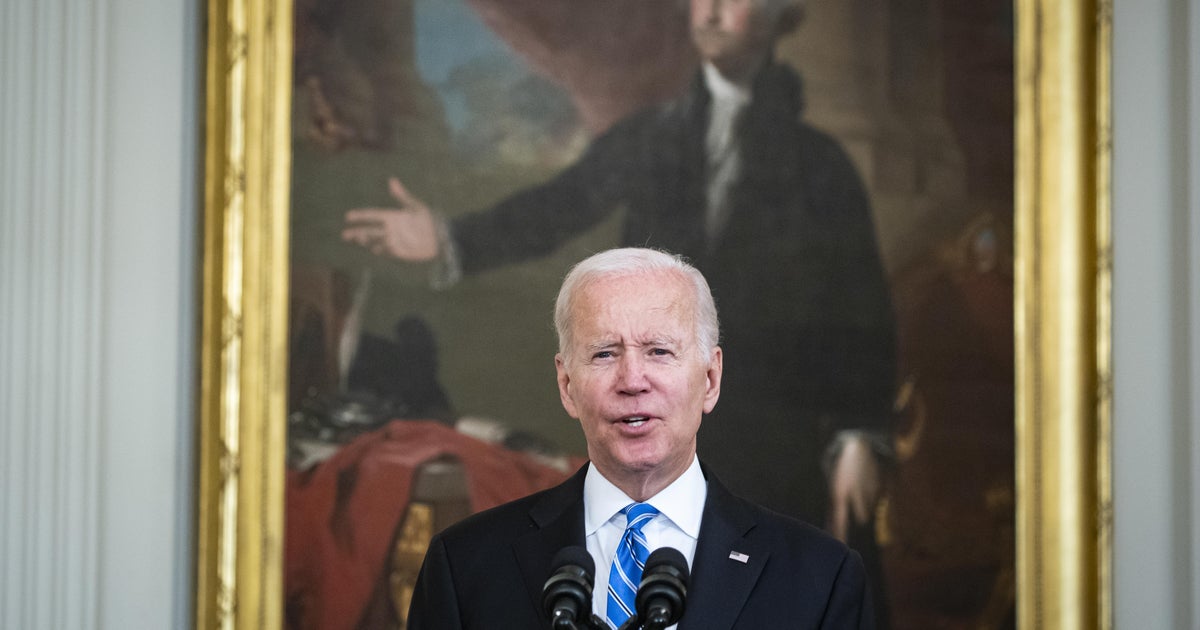Transcript: Rachael Bade and Karoun Demirjian on "Face the Nation," Oct. 16, 2022
The following is a transcript of an interview with Rachael Bade and Karoun Demirjian, authors of "Unchecked: The Untold Story Behind Congress's Botched Impeachments of Donald Trump," that aired Sunday, Oct. 16, 2022, on "Face the Nation."
MARGARET BRENNAN: We turn now to our political panel.
Rachael Bade of "Politico" is here with us and Karoun Demirjian of "The Washington Post." They're the authors of "Unchecked: The Untold Story Behind Congress' Botched Impeachments of Donald Trump."
Good morning to you ladies.
KAROUN DEMIRJIAN, (Author, "Unchecked"): Good morning.
RACHAEL BADE (Author, "Unchecked"): Good morning.
MARGARET BRENNAN: So, this is a pretty in-depth autopsy, as you can see by the size here, of what you lay out as strategic missteps, in - in many ways by Democrats themselves in their attempt to hold the former president accountable. The impeachment work, Senate didn't convict.
It feels like it's full of these moments where history could have gone in a different direction, and you lay that all out here. Why do you think it's important to do that?
RACHAEL BADE: Yeah, so there's this prevailing wisdom. There's sort of two things we're going to be challenging here in this book in our reporting. The first one is that Trump's acquittals, both of them were inevitable. We find, as you mentioned, a whole bunch of pivotal moments where things could have gone the other way -- moderate Democrat or moderate Republicans who, behind the scenes, were freaking out about Trump's behavior and came so - so close to voting to impeach or convict, but for certain things that Democrats had done that alienated them, or times when Democrats put pressure on their own investigators not to do a full investigation, to try to make the strongest case possible to the public that Trump was dangerous. And so we challenge that.
The second sort of preconceived notion we challenge is that, you know, there's this sort of sentiment out there that Republicans just sort of turned a blind eye to everything Trump did and that's why he got away with everything, while Democrats were doing the best they can to make the strongest case publicly. But, again, we find a lot of examples where Democrats were putting their political concerns over strategic fact-finding to just try to lay out the case, and - and privately they have told us that they sort of -- they didn't -- they did a half-baked impeachment and that they didn't make the strongest case possible, and some of them have regrets.
MARGARET BRENNAN: And, Karoun, I mean, in some ways the January 6th committee is a continuation of this case. Do you think that it addressed some of these mistakes, as you were laying out?
KAROUN DEMIRJIAN: I think that the work the January 6th committee has done in pulling in Republican witnesses, in making sure they fight their subpoenas all the way through the courts, is by itself a recognition that they pulled some punches when they were actually going after Trump during the first two impeachments and the first two impeachment trials. We're seeing the corrective action basically taking place in the way and the procedures in which they've gone forward with the January 6th investigation, which is going over a lot of similar ground, as at least the second impeachment trial did.
And so that is almost a tacit acknowledgment of, you know, we had the opportunity to take these steps almost two years ago, and we chose not to take them. And I think in this book we - we question -- we look at those intraparty fights, basically, that stopped those steps from happening, these moments where but for a couple more hours sometimes, but for, you know, a person's sense of confidence versus their fear of being able to, you know, actually use the congressional -- constitutional heft of the power that they had to check a president, things may have been able to go a different way. And so, yes, it's clearly a case where there were opportunities for them to go after witnesses, to run down subpoenas that they didn't take in the past that they are trying to correct in the present, but Trump's not in office anymore, and you can't have the same result.
MARGARET BRENNAN: And there was reluctance from the very top, from Speaker Pelosi.
KAROUN DEMIRJIAN: Very top.
RACHAEL BADE: That's right. That's right. We have reporting in the book that on January 6th Pelosi herself shut down an effort by some of her members to try to impeach that -- Trump that very night. And, you know, there was like -- McCarthy was furious. Republicans were just as upset as Democrats that night. I mean what would have happened if they had just done that, put it on the floor? We'll never know, of course.
MARGARET BRENNAN: (INAUDIBLE).
RACHAEL BADE: Well, that's a great question. But there was -- it was not just Pelosi, right? It was Chuck Schumer and his staff, who we learned through our reporting would put sort of pressure on Jamie Raskin's impeachment team to do a quick trial, to not summon and call and test in court their subpoenas, to go after people like Mike Pence's aides, which now the January 6th committee is doing that, but back then they just wanted the investigation to move quickly, the trial to be over with, to sort of save Biden's presidency from this messy business of impeachment.
MARGARET BRENNAN: I want to -- because what you reference there reminds me of what we just heard of this past week from the committee with this video the public at least had never seen before. I want to play some of it here in a minute.
And just for our viewers, this is where congressional leaders had been evacuated to a safe place out in Virginia during the attack. And you'll hear Speaker Pelosi and the Senate majority leader talking to the attorney general at the time, acting one, Jeffrey Rosen, and you'll see that Republicans are standing there alongside the Democrats at one point.
(BEGIN VC)
REP. SPEAKER PELOSI (D-CA): They're breaking the law in many different ways. And, quite frankly, much of it at the instigation of the president of the United States. And now if - if he could - could at least somebody --
SEN. CHUCK SCHUMER (D-NY): Yeah, why don't you get the president to tell them to leave the Capitol, Mr. Attorney General, in your law enforcement responsibility. A public statement they should all leave.
This cannot be just we're waiting for so and so. We need them there now. Whoever you got.
How soon in the future can you have the place evacuated? You know, cleaned out?
JEFFREY ROSEN (Acting Attorney General): I don't want to speak for the leadership that's going to be - that's responsible for executing the - the operation. So, I'm not going to say that because they're the - on the ground and they're the experts.
PELOSI: Well, just pretend - just pretend for a moment it was the Pentagon or the White House or some other entity that was under siege. And let me say, you can logistically get people there as you make the plan.
(END VC)
MARGARET BRENNAN: And, ultimately, we hear later from the Vice President Mike Pence speaking to Speaker Pelosi, authorizes the movement to eventually happen.
But, Karoun, you see Republican leaders there gathered with Democrats in this moment. How is it that there was no quick action?
KAROUN DEMIRJIAN: Well, as our reporting shows in a piece that actually -- an excerpt that ran in "The Atlantic" this morning, the Republicans were there across the hall to meet with the Democrats. We're in this moment and this mindset where they were basically saying, we're done with the White House. We've got to work together here to make this happen.
You had people working the phones on both sides of the aisle. McConnell was doing the exact same thing as the Democrats, trying to get people to move towards the Capitol. It's - it's - it's surprising that even with all of that effort it did still take hours for that help to arrive. But it shows you that this was a moment where kind of everybody was working - working together to achieve the same ends, which is striking in itself given how quickly that coalition splintered shortly thereafter.
Rachael referenced a moment ago that there was this moment -- our reporting showed this moment the night of January 6th, where after they left that terrible crisis hours, they're back on the floor of the -- in - in the Capitol, trying to conclude the Electoral College results. And rank and file Democrats approached the leaders with an impeachment resolution, saying, let's do this now. Let's capitalize on the anger. Let's capitalize on this galvanized sense that we're all in this together and the party lines don't matter. And Pelosi decides not to go for it in that moment.
She talks at another point in that video about being ready to throw a physical punch at President Trump, but she pulled the constitutional punch they could have potentially leveled in that moment on that day.
RACHAEL BADE: Yeah, I think the most striking thing about Fort McNair and what was happening was that it was really the first time in Trump's, you know, four years of Trump's presidency that you saw congressional leaders on both sides of the aisle sort of come together to try to bring Trump to heal. I mean, you know, McConnell, before he went over to the Democrats' room, and, by the way, we have this bizarre color in the book about how -- for some reason Republicans and Democrats were escorted to different rooms at Fort McNair despite this emergency. And they're each trying to get through to the Pentagon. They're each trying to figure out, why is the National Guard not moving. And McConnell, at one point, you know, he - his - his staff is trying to get him on the phone with top defense leaders. They're put on hold. And people were like, why are -- Republicans were furious, why - why are - he's - why's he putting on hold?
So, you know, he crosses the room. And, again, he goes and finds Pelosi and Schumer and says, we've got to work together. They -- together they were not able to get answers from the Pentagon about why things were taking so fast. And so they all agree that the only person they can really turn to right now is not Trump, it's Mike Pence.
And so they call him. And that's where we have this sort of clear the Capitol order.
MARGARET BRENNAN: Yeah.
RACHAEL BADE: It's sort of the backstory of how Pence got to that moment. It was because Hill leaders, together, were - were pleading with him to do something.
MARGARET BRENNAN: And - and it's - it's a powerful read. It's a powerful moment. And, ultimately, it raises even more questions.
RACHAEL BADE: Yeah.
MARGARET BRENNAN: About the path we're on. Ladies, congratulations on the book. We'll leave it there and be right back.



